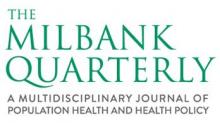Found 2 resources.
0
0
0
Research suggests that two-generation (2Gen) approaches can help interrupt the economic and social barriers to many families’ economic mobility and increased well-being and carry long-term benefits. Child Trends – in partnership with Ascend at the Aspen Institute – conducted new analyses for this report, which provides a current data snapshot of some of the families in the United States who may be eligible for and benefit from 2Gen supports and services. Policymakers, researchers, and program evaluators should pay attention to these same data points in efforts to assess families’ needs and...
Topics: Advocacy, Dual-generation, dual-generation initiative, Low-income, Mobility
 Shared by Molli Caite Hughes
on Jan 18, 2024
Shared by Molli Caite Hughes
on Jan 18, 2024 0
0
0

Poor maternal and child health (MCH) outcomes and rates of chronic disease are persistently high in the United States and concentrated in rural and service-deprived areas where local health departments provide most care. In a new Milbank Quarterly study, Taryn A. G. Quinlan, Amelia L. Mitchell, and Glen P. Mays of the Colorado School of Public Health use national survey data from 630 local health departments to understand the relationship between social service collaboration and the provision of direct MCH services, such as the Special Supplemental Nutrition Program for Women, Infants, and...
Topics: dual-generation initiative, Early childhood, Health, Low-income, Partnerships, Research
 Shared by Sandra Ware
on Feb 7, 2023
Shared by Sandra Ware
on Feb 7, 2023 